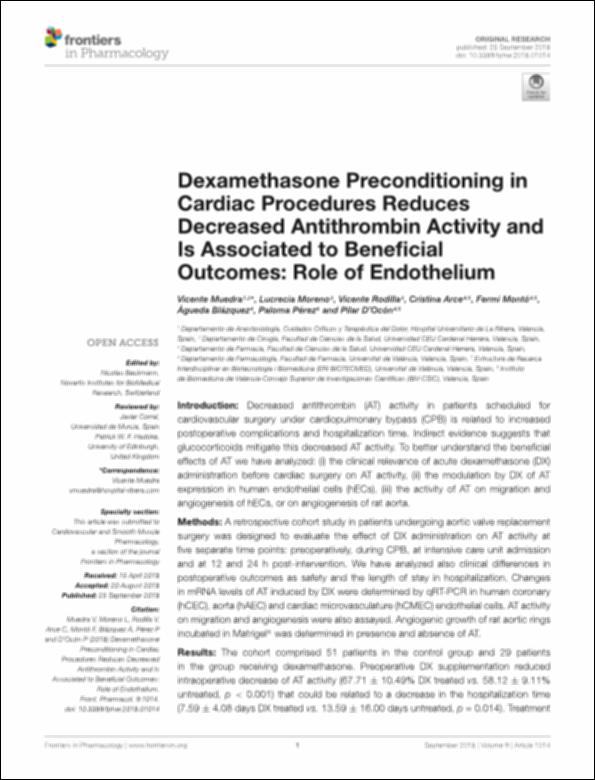Please use this identifier to cite or link to this item:
http://hdl.handle.net/10637/10229Dexamethasone preconditioning in cardiac procedures reduces decreased antithrombin activity and is associated to beneficial outcomes : role of endothelium
| Title: | Dexamethasone preconditioning in cardiac procedures reduces decreased antithrombin activity and is associated to beneficial outcomes : role of endothelium |
| Authors : | Muedra Navarro, Vicente Moreno Royo, Lucrecia Rodilla Alama, Vicente Arce Recatalá, Cristina Montó Guillot, Fermí Blázquez Bernal, Águeda Pérez Sánchez, Paloma D'Ocon Navaza, Pilar |
| Keywords: | Heart - Surgery.; Endothelium.; Dexamethasone - Therapeutic use.; Endotelio.; Antithrombins.; Dexametasona - Uso terapéutico.; Corazón - Cirugía.; Antitrombinas. |
| Publisher: | Frontiers Media. |
| Citation: | Muedra, V., Moreno, L., Rodilla, V., Arce, C., Montó, F., Blázquez, Á. et al. (2018). Dexamethasone preconditioning in cardiac procedures reduces decreased antithrombin activity and is associated to beneficial outcomes : role of endothelium. Frontiers in Pharmacology, vol. 9 (septembre), art. 1014. DOI: https://doi.org/10.3389/fphar.2018.01014 |
| Abstract: | Introduction: Decreased antithrombin (AT) activity in patients scheduled for cardiovascular surgery under cardiopulmonary bypass (CPB) is related to increased postoperative complications and hospitalization time. Indirect evidence suggests that glucocorticoids mitigate this decreased AT activity. To better understand the beneficial effects of AT we have analyzed: (i) the clinical relevance of acute dexamethasone (DX) administration before cardiac surgery on AT activity, (ii) the modulation by DX of AT expression in human endothelial cells (hECs), (iii) the activity of AT on migration and angiogenesis of hECs, or on angiogenesis of rat aorta. Methods: A retrospective cohort study in patients undergoing aortic valve replacement surgery was designed to evaluate the effect of DX administration on AT activity at five separate time points: preoperatively, during CPB, at intensive care unit admission and at 12 and 24 h post-intervention. We have analyzed also clinical differences in postoperative outcomes as safety and the length of stay in hospitalization. Changes in mRNA levels of AT induced by DX were determined by qRT-PCR in human coronary (hCEC), aorta (hAEC) and cardiac microvasculature (hCMEC) endothelial cells. AT activity on migration and angiogenesis were also assayed. Angiogenic growth of rat aortic rings incubated in Matrigel R was determined in presence and absence of AT. Results: The cohort comprised 51 patients in the control group and 29 patients in the group receiving dexamethasone. Preoperative DX supplementation reduced intraoperative decrease of AT activity (67.71 10.49% DX treated vs. 58.12 9.11% untreated, p < 0.001) that could be related to a decrease in the hospitalization time (7.59 4.08 days DX treated vs. 13.59 16.00 days untreated, p = 0.014). Treatment of hECs with 500 nM DX slightly increased AT expression. Incubation with 0.5 and 1 IU/mL of AT increased migration and angiogenesis in hCAECs and hAECs, but not in hCMECs. The same concentrations of AT potentiated angiogenic sprouting of new vessels from rat aorta. Conclusion: Preoperative DX supplementation could be an interesting procedure to avoid excessive decrease in AT levels during cardiac surgery. Positive outcomes associated with maintaining adequate AT levels could be related to its potential beneficial effect on endothelial function (migration and angiogenesis). |
| Description: | Este artículo se encuentra disponible en la página web de la revista en la siguiente URL: https://www.frontiersin.org/articles/10.3389/fphar.2018.01014/full |
| URI: | http://hdl.handle.net/10637/10229 |
| Rights : | http://creativecommons.org/licenses/by/4.0/deed.es |
| ISSN: | 1663-9812. |
| Issue Date: | 1-Sep-2018 |
| Center : | Universidad Cardenal Herrera-CEU |
| Appears in Collections: | Dpto. Farmacia |
Items in DSpace are protected by copyright, with all rights reserved, unless otherwise indicated.


